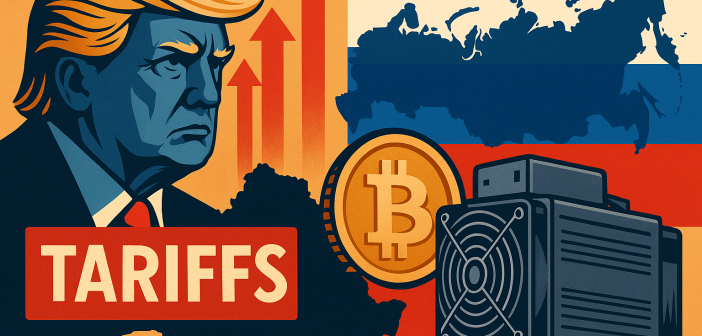The Luxor Russia Trump tariffs prediction by a Luxor Technology executive highlights how Trump’s policies could reshape the global crypto mining landscape, with Russia gaining from lower equipment costs.
Luxor Technology Warns of Shifting Mining Dynamics
Luxor Technology, a U.S.-based firm specializing in crypto mining services, expects Russia to gain the most from President Donald Trump’s trade tariffs if they fully impact the mining equipment supply chain. Ethan Vera, Luxor’s Chief Operating Officer, shared this insight in an interview with The Block. Luxor, which operates mining pools and provides custom software, serves the U.S. as its largest market but also supports miners in 32 countries. Vera highlighted that a decline in U.S. demand due to tariffs could redirect equipment supplies to other regions, with Russia poised to benefit significantly.
Why Russia Stands to Gain
Vera explained that Luxor currently faces a 12.6% tariff on devices shipped from Asia to the U.S., with an expected increase to 26.6–38.6% in July 2025, depending on the country of origin. If these tariffs extend to the entire supply chain, Russia could see a major advantage. Lower U.S. demand would likely reduce global equipment prices, allowing Russian mining firms to buy at a discount. Additionally, Vera noted that Chinese investors, facing higher costs in the U.S., may redirect capital to Russia’s mining sector, further boosting its growth.
Global Mining Investment Shifts
While Russia benefits, Vera predicts that U.S. and European investors will shift focus to alternative regions like Canada, Northern Europe, Ethiopia, Brazil, Argentina, Chile, and Paraguay. These areas offer more favorable conditions amid the tariff uncertainty. Meanwhile, manufacturers like Bitmain and Bitdeer are adapting by opening production lines in the U.S., though this may not fully mitigate the impact on miners reliant on imported equipment.
Beyond Tariffs: Energy Costs Drive Mining Decisions
Trump expressed in June 2024 a desire to make the U.S. a hub for mining the remaining Bitcoin supply. However, the choice of mining location often hinges on access to cheap electricity rather than policy incentives. BitFuFu, a cloud mining and hosting provider, emphasized that electricity—not equipment costs—is the largest expense for miners. The company deploys its devices at self-managed sites to control energy costs. According to CoinShares, the cost to mine one Bitcoin in the U.S. rose to $82,162 in Q4 2024, up from $55,950 the previous quarter, underscoring the challenge of rising operational expenses.
U.S. Policy and Energy Solutions
U.S. authorities are also addressing miners’ energy use. In late April 2025, Commerce Secretary Howard Lutnick urged Bitcoin mining firms to build data centers near gas fields, construct power plants, and use associated gas to generate energy for mining. This push aims to reduce reliance on traditional grids while tackling environmental concerns, though it highlights the broader tension between policy goals and practical challenges in the U.S. mining sector.




